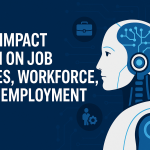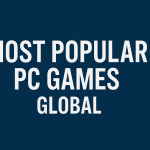In today’s highly connected world, digital marketing has emerged as the foundation of brand communication, customer engagement, and business growth. With the internet influencing every aspect of life — from the way we shop to how we learn — companies that fail to establish a strong digital presence risk losing their relevance. As of early 2024, more than 5.35 billion people are active internet users globally, which is around 66% of the world’s population (DataReportal, 2024). This widespread adoption of technology makes digital marketing a non-negotiable part of any business strategy.
What is Digital Marketing?
At its core, digital marketing involves promoting products and services through digital channels like:
-
Websites
-
Social media platforms
-
Search engines
-
Email
-
Mobile apps
-
Online advertising
Unlike traditional marketing, which relies heavily on physical media such as newspapers, television, and radio, digital marketing offers instant reach, real-time engagement, and data-driven insights (HubSpot).
Key Components of Digital Marketing
-
Search Engine Optimization (SEO): Optimizing your website and content to rank higher in search engine results (Moz).
-
Content Marketing: Creating and sharing valuable content to attract and retain a clearly defined audience (Content Marketing Institute).
-
Social Media Marketing: Leveraging platforms like Facebook, Instagram, LinkedIn, and TikTok to engage and grow audiences.
-
Pay-Per-Click Advertising (PPC): Running paid ads on platforms like Google Ads and Facebook Ads.
-
Email Marketing: Sending targeted messages and newsletters to a subscribed audience (Mailchimp).
-
Affiliate and Influencer Marketing: Partnering with individuals or organizations to promote your brand.
Each of these channels can work independently but are most powerful when integrated into a unified strategy.
Why Digital Marketing is Crucial Today
1. Global Reach at Lower Costs
Traditional marketing is often expensive and geographically limited. Digital marketing, however, allows businesses to reach audiences across continents at a fraction of the cost (Forbes).
2. Measurable Results
With tools like Google Analytics, Facebook Insights, and HubSpot CRM, marketers can track campaign performance in real-time. Metrics like impressions, clicks, conversions, and customer journeys can be closely monitored (Google Analytics).
3. Personalization
Personalized marketing boosts customer satisfaction and loyalty. According to a report by McKinsey & Company, companies that personalize experiences can generate 40% more revenue than those that don’t (McKinsey, 2021).
4. Better Customer Relationships
Through constant engagement via emails, social media posts, and interactive websites, brands can foster deeper relationships with customers, turning them into loyal advocates.
Evolution of Digital Marketing
The first recognizable digital marketing campaign occurred in 1994 when AT&T ran the first banner ad online. Since then, the field has evolved dramatically:
-
Early 2000s: Email marketing and SEO dominated.
-
2010s: Social media and influencer marketing gained prominence.
-
2020s: AI, automation, personalization, and omnichannel experiences now define digital marketing strategies (Marketing Evolution).
Today, companies integrate technologies like artificial intelligence, machine learning, and augmented reality to create immersive brand experiences.
Key Trends Shaping the Future of Digital Marketing
1. Artificial Intelligence and Automation
AI tools are revolutionizing customer service (chatbots), content creation (generative AI), and campaign optimization (predictive analytics). According to PwC, AI could contribute up to $15.7 trillion to the global economy by 2030 (PwC).
2. Voice Search Optimization
With the growing use of smart speakers like Amazon Alexa and Google Home, voice searches are becoming more common. It’s estimated that by 2025, half of all online searches will be voice-based (Search Engine Journal).
3. Video Content Domination
Short-form videos (like TikTok videos, Instagram Reels, and YouTube Shorts) are achieving higher engagement rates than other content types. Studies show that people retain 95% of a message when they watch it in a video compared to 10% when reading it in text (Forbes).
4. Sustainable and Ethical Marketing
Consumers, especially Gen Z, prefer brands that are environmentally responsible and socially conscious. Ethical marketing practices are no longer optional but essential for brand reputation.
5. Interactive Content
Quizzes, polls, surveys, and interactive infographics are growing in popularity because they encourage user participation, increasing engagement and time spent on the website.
Challenges in Digital Marketing
Despite its many advantages, digital marketing faces challenges:
-
Data Privacy Regulations: Laws like GDPR and CCPA impose strict regulations on how customer data can be collected and used (European Commission).
-
Ad Fatigue: Consumers are increasingly ignoring or blocking ads.
-
Algorithm Changes: Constant updates to Google, Facebook, and Instagram algorithms can unpredictably impact visibility.
Marketers must remain agile and continuously adapt strategies to stay effective.
Building an Effective Digital Marketing Strategy
Here are essential steps to build a strong digital marketing plan:
-
Define Clear Goals: Increase brand awareness, generate leads, boost sales, etc.
-
Understand Your Audience: Develop detailed buyer personas.
-
Select the Right Channels: Focus on platforms where your audience spends most of their time.
-
Create Quality Content: Consistency, authenticity, and value are key.
-
Monitor and Optimize: Use analytics to assess performance and refine tactics continuously.
A combination of creativity, technology, and data analysis is crucial to succeeding in today’s competitive online landscape.
Conclusion
Digital marketing is not just a trend; it’s the future of business success. Brands that harness the power of digital channels and new technologies will stay competitive and build lasting relationships with their audiences.
As marketing visionary Seth Godin aptly put it, “Marketing is no longer about the stuff you make, but about the stories you tell.” In a world driven by clicks, shares, and conversations, telling the right story through the right digital medium can transform brands and change lives.
The digital revolution isn’t slowing down. It’s time for businesses, big and small, to embrace digital marketing not as an add-on — but as the very core of their growth strategy.









